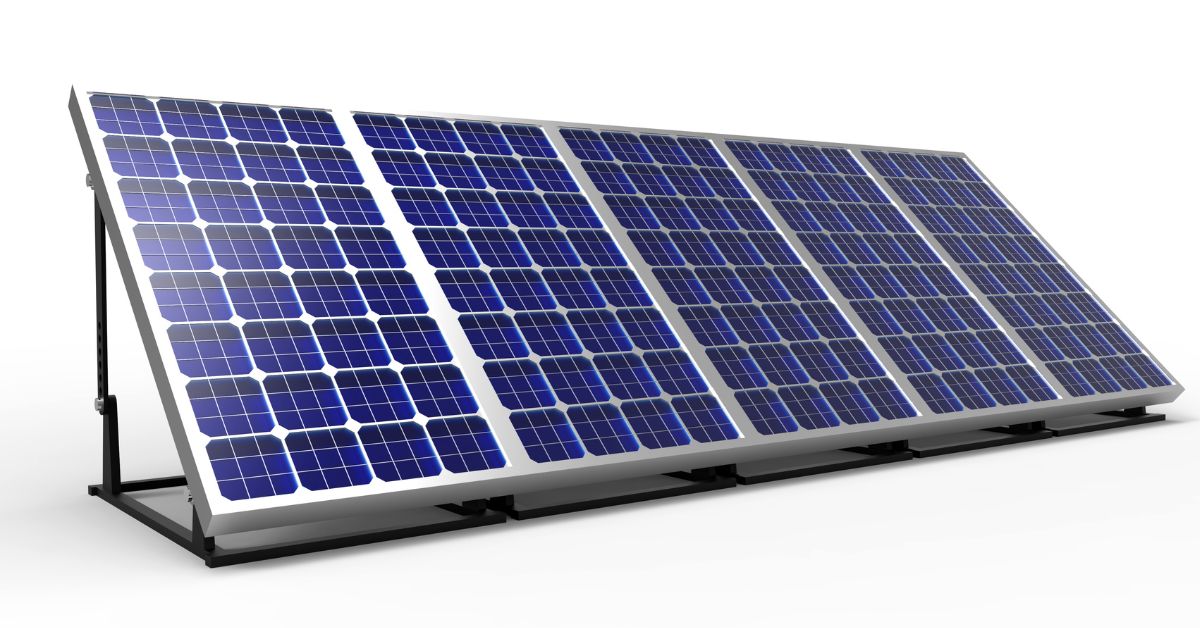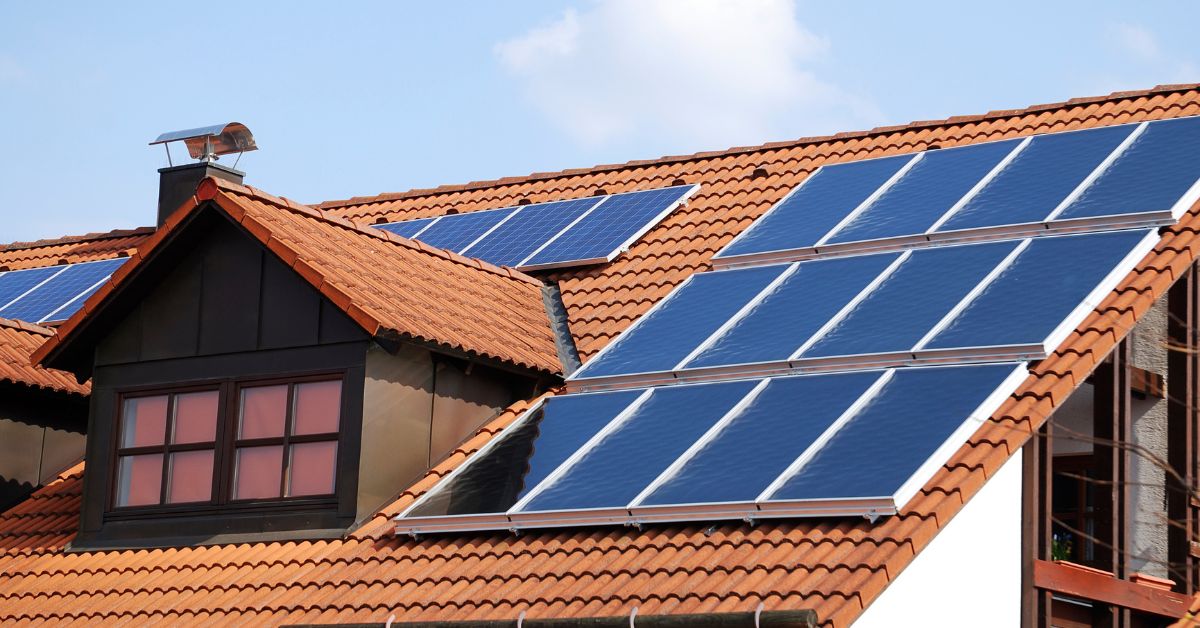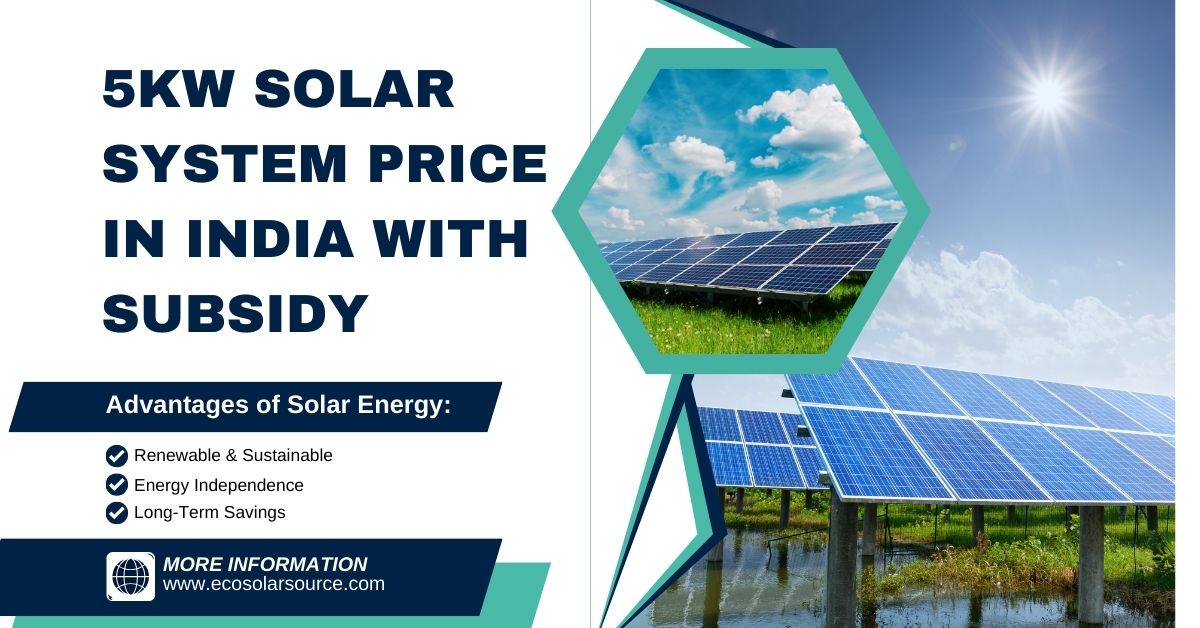5kw Solar System Price in India With Subsidy
A 5kw Solar System Price in India With Subsidy is an ideal solution for residential and small commercial energy needs. Priced between ₹80,000 to ₹1.5 lakhs after subsidy, the cost varies depending on the type (on-grid, off-grid, or hybrid).
The government’s subsidy of up to 40% for residential consumers significantly reduces upfront expenses, making solar power more affordable. This system generates around 20-25 units of electricity per day, sufficient for an average household’s daily consumption. Over time, it offers substantial savings on electricity bills, reduces carbon footprint, and provides a reliable alternative to conventional energy sources.
Table of Contents
5kW Solar System Price in India with Subsidy: A Comprehensive Guide for 2024
As the world becomes more environmentally conscious, renewable energy sources such as solar power have gained significant traction. Solar energy, in particular, is being embraced by households and businesses across the globe due to its ability to reduce carbon footprints while lowering electricity bills. In India, the demand for solar energy systems has skyrocketed, and government initiatives like subsidies have made solar power more affordable for the common man.
One of the most popular choices for residential and small business installations is the 5kW solar system. This system is ideal for homes and small commercial establishments as it generates enough electricity to meet moderate to high energy consumption needs. In this article, we’ll explore the 5kW solar system price in India, including government subsidies, installation costs, and factors that influence pricing.
What Is a 5kW Solar System?
A 5kW (kilowatt) solar system refers to a solar photovoltaic (PV) system that can generate 5,000 watts (5 kW) of electrical power under ideal conditions, typically measured under full sunlight exposure. A 5kW system can produce approximately 20 to 25 units (kilowatt-hours or kWh) of electricity per day, depending on the location and the amount of sunlight available. This capacity is usually enough to power a medium to the large household with daily energy requirements ranging from 15 to 20 units.
Components of a 5kW Solar System
A solar system comprises several critical components, each serving an essential function in the generation, conversion, and storage of energy. The main components of a 5kW solar system include:

- Solar Panels: Solar PV panels convert sunlight into electrical energy. For a 5kW system, approximately 12 to 16 solar panels (with a capacity of 320W to 400W each) are needed, depending on the panel’s efficiency.
- Inverter: Solar inverters convert the DC (direct current) electricity generated by solar panels into AC (alternating current) electricity, which is used in homes and businesses. The type of inverter required depends on the system configuration—whether it’s a grid-tied system, off-grid, or hybrid.
- Mounting Structure: The structure used to hold the solar panels in place, typically installed on rooftops or open spaces, must be sturdy and well-aligned to maximize solar exposure.
- Batteries (for off-grid or hybrid systems): In off-grid or hybrid systems, batteries are used to store excess electricity generated during the day for use at night or during power outages.
- Wiring and Cabling: High-quality wiring and cabling ensure the safe and efficient transfer of electricity between system components.
- Monitoring System: A solar monitoring system allows you to track your system’s performance, energy generation, and consumption in real time.
Benefits of a 5kW Solar System
There are several benefits to installing a 5kW solar system in your home or business:
- Significant Cost Savings: A 5kW solar system can drastically reduce or even eliminate your monthly electricity bills, depending on your energy usage. Over time, the system pays for the itself through energy savings.
- Energy Independence: With solar power, you’re less reliant on the grid, reducing the impact of electricity rate hikes and power outages.
- Eco-Friendly: Solar energy is a clean, renewable source of energy that reduces greenhouse gas emissions, helping to mitigate climate change.
- Government Subsidies and Incentives: In India, the government offers subsidies and incentives for installing solar systems, reducing the initial investment and making solar power more affordable.
- Low Maintenance: Solar systems require minimal maintenance, mainly involving periodic cleaning of the panels and occasional checks of the inverter and wiring.
5kW Solar System Price in India (2024)
The cost of installing a 5kW solar system in India can vary widely based on several factors, such as the type of system (on-grid, off-grid, or hybrid), the quality of components used, installation charges, and regional differences. However, to give you a general idea, the price of a 5kW solar system in India (before subsidy) typically falls in the following ranges:
- On-Grid Solar System: ₹2,50,000 to ₹3,50,000
- Off-Grid Solar System: ₹3,00,000 to ₹4,50,000
- Hybrid Solar System: ₹4,00,000 to ₹5,50,000
The difference in pricing across these categories is primarily due to the additional cost of batteries in off-grid and hybrid systems, as well as the more complex installation requirements.
Types of Solar Systems
Before we delve further into pricing, it’s important to understand the types of solar systems available, as this will directly affect both cost and functionality.

- On-Grid Solar System: In an on-grid system, the solar panels are connected to the main electrical grid. This allows the household to export excess electricity to the grid (which can result in net metering benefits) and import electricity from the grid when the solar system is not generating enough power (e.g., during nighttime).Cost Range: ₹2,50,000 to ₹3,50,000Advantages:
- Lower cost compared to off-grid and hybrid systems.
- No need for batteries.
- Net metering allows you to earn credits for excess electricity generated.
- Does not provide backup power during grid outages.
- Relies on the availability of the main grid.
- Off-Grid Solar System: An off-grid system is completely independent of the main grid and requires batteries to store electricity for use during the night or on cloudy days. This type of system is ideal for remote areas without reliable access to the electrical grid.Cost Range: ₹3,00,000 to ₹4,50,000Advantages:
- Complete energy independence from the grid.Provides backup power during outages.
- Higher cost due to batteries.
- Requires more maintenance for battery care and replacement.
- Hybrid Solar System: A hybrid system combines the best of both on-grid and off-grid systems. It allows you to store energy in batteries while remaining connected to the grid, providing flexibility in how you use your solar-generated electricity. Cost Range: ₹4,00,000 to ₹5,50,000Advantages:
- Provides backup power during grid outages.Can sell excess electricity to the grid.Offers more control over energy usage and storage.
- Higher upfront cost due to batteries and advanced inverters.
- More complex installation and maintenance.
Factors Affecting 5kW Solar System Price in India
Several factors influence the price of a 5kW solar system in India. These factors must be carefully considered to estimate the overall cost of the system:
- Type of Solar Panels: The efficiency and quality of solar panels can have a major impact on the price. High-efficiency monocrystalline panels are more expensive than polycrystalline panels but require less space and may produce more energy.
- Inverter Quality: The type and brand of inverter used can also affect the overall price. Higher-quality inverters may come at a premium but provide better efficiency and durability.
- Battery Storage: For off-grid and hybrid systems, the cost of batteries can significantly increase the system’s price. The type of battery (lead-acid vs. lithium-ion) and its capacity will determine its cost.
- Location and Installation Costs: The cost of installation can vary depending on the location, the complexity of the installation (e.g., rooftop vs. ground-mounted), and the type of structure.
- Subsidies and Government Schemes: Government subsidies and incentives can significantly reduce the initial cost of a solar system. In India, the central and state governments offer various subsidy schemes to promote solar adoption.
Solar Subsidy in India (2024)
The Government of India, through the Ministry of New and Renewable Energy (MNRE), provides subsidies to promote the use of solar power under the Rooftop Solar Scheme. The subsidy is available for residential consumers (both individual homes and housing societies) and not for commercial or industrial users.
The subsidy is based on the capacity of the solar system and can reduce the upfront cost of the system by up to 40% for systems up to 3kW and 20% for systems above 3kW and up to 10kW.
For a 5kW solar system, the applicable subsidy would be:
- 3kW: 40% subsidy
- Remaining 2kW: 20% subsidy
For example, if the total cost of a 5kW on-grid solar system is ₹3,00,000, the subsidy would be calculated as follows:
- For the first 3kW: ₹3,00,000 x 3/5 = ₹1,80,000. Subsidy = 40% of ₹1,80,000 = ₹72,000.
- For the remaining 2kW: ₹3,00,000 x 2/5 = ₹1,20,000. Subsidy = 20% of ₹1,20,000 = ₹24,000.
Therefore, the total subsidy for a 5kW system would be ₹72,000 + ₹24,000 = ₹96,000.
The net cost after subsidy would be ₹3,00,000 – ₹96,000 = ₹2,04,000.
Steps to Avail Solar Subsidy in India
To avail of the solar subsidy in India, follow these steps:
- Contact an Empaneled Installer: The MNRE has authorized several empaneled installers to carry out rooftop solar installations. You must choose one of these installers to avail the subsidy.
- Submit Application: Apply for the subsidy through the empaneled installer. The installer will guide you through the process and submit the necessary paperwork on your behalf.
- Installation: Once the application is approved, the installation process will begin. The installer will install the solar panels, inverter, and other components.
- Inspection and Approval: After the installation, the system will be inspected by the concerned authorities to ensure it meets the required standards. Once approved, the subsidy amount will be credited to your bank account or deducted from the total installation cost.
Additional Incentives and Benefits
Apart from the government subsidy, there are several other financial incentives and benefits to installing a solar system in India:

- Net Metering: Many states in India offer net metering, allowing consumers to sell excess electricity generated by their solar system back to the grid. This results in credits that can offset future electricity bills.
- Tax Benefits: Businesses installing solar systems can avail themselves of accelerated depreciation benefits, which allow them to write off a significant portion of the system’s cost in the first year, reducing taxable income.
- Zero EMI Financing: Some solar companies offer zero EMI financing options, allowing homeowners to pay for their solar system in easy installments without any interest.
FAQs About 5kw Solar System Price in India With Subsidy
Q1. What is the average price of a 5kW solar system in India before subsidy?
The price of a 5kW solar system in India typically ranges from ₹2.5 lakh to ₹3.5 lakh before applying any government subsidies. However, the cost can vary depending on factors such as the type of solar panels, brand, and installation complexity.
Q2. How much subsidy is available for a 5kW solar system in India?
The government offers subsidies for rooftop solar installations under its Solar Rooftop Scheme. For residential installations, subsidies can be around 20% to 40% depending on the state and DISCOM, with limits varying according to the system capacity.
Q3. What will be the price of a 5kW solar system after applying the subsidy?
After applying subsidies, the cost of a 5kW solar system could be reduced by approximately ₹50,000 to ₹1.2 lakh, depending on the subsidy percentage and applicable state policies. This brings the total price to around ₹2 lakh to ₹2.5 lakh.
Q4. Is there a difference in subsidy between residential and commercial installations?
Yes, subsidies are primarily available for residential solar systems. Commercial and industrial setups generally do not receive government subsidies, making their installation costs higher compared to residential systems.
Q5. How long does it take to recover the investment in a 5kW solar system?
The payback period for a 5kW solar system is usually between 4 to 6 years, depending on factors such as electricity consumption, savings, and the amount of sunlight the panels receive.
Q6. What is the average monthly electricity savings with a 5kW solar system?
A 5kW solar system can generate around 20 to 22 kWh per day, translating to monthly savings of approximately ₹5,000 to ₹8,000, depending on the electricity rate in your area.
Q7. Are there any ongoing maintenance costs for a 5kW solar system?
Solar systems generally require minimal maintenance. However, cleaning the panels and occasional servicing may be needed. The annual maintenance cost is relatively low, around ₹5,000 to ₹10,000 per year.
Q8. What is the lifespan of a 5kW solar system?
Most solar panels come with a warranty of 25 years. However, the efficiency of the panels may slightly decrease over time. Inverters, on the other hand, may need to be replaced every 10 to 15 years.
Q9. How much space is required for installing a 5kW solar system?
A 5kW solar system typically requires around 400 to 500 square feet of shadow-free roof space for optimal installation and efficiency.
Q10. What documents are required to apply for the subsidy?
To avail of the subsidy, you’ll need documents such as proof of residence, recent electricity bill, system installation details, vendor certification, and bank account information. The process varies slightly by state.
Investing in a 5kW solar system in India is a smart decision for both homeowners and small businesses. Not only does it provide long-term savings on electricity bills, but it also contributes to a cleaner, greener environment. With the added advantage of government subsidies, installing a solar system has become more affordable than ever.
Whether you choose an on-grid, off-grid, or hybrid system, the price of a 5kW solar system in India can vary based on several factors. However, with government subsidies and incentives, the initial cost can be significantly reduced, making it a viable option for many households.
A 5 kW solar system in India offers an excellent opportunity for homeowners to save on electricity bills while contributing to a greener environment. With government subsidies, the cost becomes significantly more affordable, making solar energy accessible to a broader population.
The price varies depending on the type of solar panels and installation costs, but subsidies can cover up to 40% of the total cost. This makes solar a long-term, cost-effective solution. Investing in solar power today not only reduces your carbon footprint but also ensures energy independence and financial savings over time.
As solar technology continues to improve and prices decrease, now is the perfect time to switch to solar energy and take advantage of the numerous benefits it offers. Solar power not only reduces your electricity costs but also enhances the value of your property and supports India’s mission to increase its renewable energy capacity.
Click here to learn more about 5kw Solar System Price in India With Subsidy
Click here to learn more about 2kw Solar System Price Subsidy India

